Midweek Review
The rise of the Bonapartists: A political history of post-1977 Sri Lanka – II
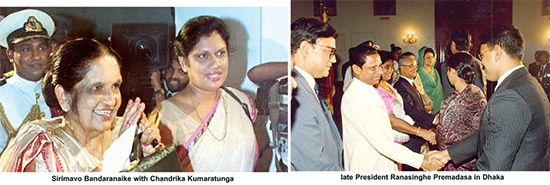
By Uditha Devapriya
There were three Bonapartist revolutions in post-independence Sri Lanka. The first was Ranasinghe Premadasa’s election in 1989, the second Mahinda Rajapaksa’s election in 2005 and his re-election in 2010, and the third Gotabaya Rajapaksa’s election in 2019. I consider Premadasa, Mahinda, and Gotabaya to be more Bonapartist than fascist, contrary to most accounts of them by the liberal intelligentsia. There is an important distinction to be made, as important as the distinction between the Old Right and the New Right.
A crucial difference between Bonapartism and fascism, with which Bonapartism is often conflated, is that the one responds to the public and the other regiments it. Bonapartism can deteriorate into fascism and it not infrequently does, yet its inherently populist-pluralist character deters it from doing so unless its co-option by a rightwing fringe group makes such a transformation inevitable. The latter point is important.
Here one must consider the first Bonapartist revolution, along with its impact on the Right. Mervyn de Silva called the 1988 election an event of sociological significance on account of who won it. Ranasinghe Premadasa has been called many things by many people. At the end of the day, regardless of whatever epithets or insults, he was, and remained until his passing away, a Bonapartist tied despite his populist trappings to the Right.
Yet, under Premadasa the J. R. model altered considerably. Development theorists of the Left, including Samir Amin, were by then propounding a paradigm of delinking in response to IMF enforced dependence on MNCs. This was the position taken up by the Left as well, and it was in keeping with the Soviet Union’s policy of disengagement. Regarding the latter, it must be mentioned that the intelligentsia of the Third World put forward a different strategy at the height of their influence: a bourgeois modernisation scheme, with emphasis on industrialisation. This is what Sirimavo Bandaranaike tried to adhere to.
As I have noted in my essays on the NAM to The Island, such an approach fell victim to its own contradictions, top among them the inability of bourgeois nationalist elites to take modernisation forward to its logical conclusion. Out of fashion then and out of fashion now, the bourgeoisie opted out of BOTH disengagement AND delinking.
In Premadasa they found the champion of their model: an open economy minus what the latter decried as “old style capitalism” vis-à-vis his predecessor. This, then, would be how the Bonapartist was to shed off the Old Right’s embracement of neoliberalism.
Foreign policy wise, Premadasa differed from Jayewardene’s pro-Western posturing. In 1977 Jayewardene stated that his policy of nonalignment would be “more genuine” that what it had been under his predecessor. Two years later, however, the New York Times reported his famous quote about nonalignment, the US, and the Soviet Union. With the establishment of the Greater Colombo Economic Commission (GCEC), the government tilted definitively to not just the US but also Britain and ASEAN: Motorola and Harris Corporation began building plants “with an initial employment capacity of 1,850 workers.”
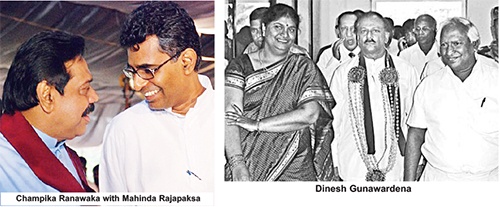 Goh Chok Tong’s and Lee Kuan Yew’s visits to Sri Lanka reinforced the belief that Sri Lanka would regain its interrupted journey to becoming the Singapore of South Asia, a prospect promised by the Mahaweli Development Scheme.
Goh Chok Tong’s and Lee Kuan Yew’s visits to Sri Lanka reinforced the belief that Sri Lanka would regain its interrupted journey to becoming the Singapore of South Asia, a prospect promised by the Mahaweli Development Scheme.
This put the country at the backbenches of the pro-Western bloc in the Non-Aligned Movement: while Jayewardene courted Western European and American help, he was careful not to alienate the non-Western bloc. His warm rapport with Fidel Castro, for all the theatrics of Third World unity at the 1979 NAM Conference in Havana, belied his pro-US sympathies, as did his appointment of A. C. S. Hameed as Foreign Minister.
Less well apparent was his selection of Premadasa as an emissary of sorts to multilateral institutions. At the 1980 UN General Assembly, Premadasa called upon developed countries to shoulder their share of responsibility for underdeveloped countries. He was firm on this point: responding to a remark by Michael Littlejohns (of Reuters) that OPEC’s intransigence prevented the First World from aiding the Third, he politely but firmly contended, “You can keep on saying that, but it will do no one any good.”
It hardly need be added that after he became President, Premadasa took positions on foreign policy which contradicted some of Jayewardene’s, such as his expulsion of David Gladstone and his closure of the Israeli Special interests Section at the US Embassy; the latter act went as far as to provoke a confrontation with Stephen Solarz.
At a fundamental level, however, Premadasa’s vision remained bogged down in the IMF paradigm: Janasaviya, after all, was, despite its pro-poor leanings, funded by the World Bank. In other words, it continued to alienate the section of the middle-class – Sinhala Buddhist – which had evolved a cultural critique of neoliberalism.
In the absence of, on the one hand, a strong trade union driven Left movement, and on the other hand an equally strong radical youth movement – both decimated by Premadasa and Jayewardene – the Oppositional space gravitated to a nationalist-populist vacuum. What remained of the amorphous Mahajana Pakshaya (SLMP) gravitated either to the UNP (Ossie Abeygunasekera) or to the People’s Alliance (Chandrika Kumaratunga).
Premadasa courted considerable support among sections of the middle-class as well as the petty bourgeoisie, including artists and the clergy (as seen in the latter’s act of siding with his government after Gamini and Lalith launched their campaign against him). Yet in one respect he remained a part Bonapartist and not a total one: his inability to respond to the cultural critique of his politico-economic paradigm.
This widened a vacuum, filled by the Jathika Chintanaya; the latter’s evolution from an intellectual to a political movement, from Nalin de Silva and Gunadasa Amarasekara to S. L. Gunasekara and Champika Ranawaka, has been charted many times before by several commentators. All that needs to be noted here is that in the absence of a political critique of neoliberalism, especially in the face of neoliberalism’s consolidation by the People’s Alliance under Chandrika Kumaratunga, the cultural critique gained ground.
What helped that critique gain even more ground was the capitulation of the Left to the neoliberal line of the SLFP, as well as the dismantling of the state by the first Kumaratunga government. The latter point is significant, for unlike J.R. and Premadasa Kumaratunga set about rolling back the state while opening up the economy.
As Dayan Jayatilleka has suggested, the cooption of the Kumaratunga regime by NGOs and the new “civil society” did much to provoke the Sinhala nationalist lobby. Incensed, the latter sought a third force. In the absence of a viable Left alternative – for Kumaratunga’s first term was marked by the deterioration of the Left within the People’s Alliance – the critique of neoliberalism soon became a monopoly of cultural revivalists.
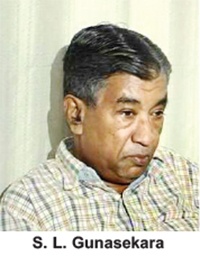 It must be noted that the SLFP-PA’s rightward shift did not transpire in a vacuum. After a decade of Reaganomics and Thatcherism, the Democrats in the US and the Labourites in Britain embraced what they euphemistically called “Third Way Centrism”, discarding their Marxist roots while embracing a neoliberal line. In Bill Clinton and Tony Blair, the new SLFP thus had its Western archetypes to look up to, and to emulate.
It must be noted that the SLFP-PA’s rightward shift did not transpire in a vacuum. After a decade of Reaganomics and Thatcherism, the Democrats in the US and the Labourites in Britain embraced what they euphemistically called “Third Way Centrism”, discarding their Marxist roots while embracing a neoliberal line. In Bill Clinton and Tony Blair, the new SLFP thus had its Western archetypes to look up to, and to emulate.
Jayatilleka has argued that the SLFP-PA’s turn to the right was pragmatist. I disagree: it ended up decimating the Left, something not even three UNP administrations could do and something which paved the way for the nationalist lobby to gain in strength and numbers despite its convoluted, contradictory positions on the economy.
Indeed, the contents of the latter’s economic programme revealed its contradictions: the Sihala Urumaya Manifesto of 2000, to give a sampling, rejected a closed economy while rejecting neoliberalism, acknowledging that while “going back to a closed economy” was “unthinkable” it would, in stark contrast to its opposition to neoliberalism, avail itself “of the opportunities thrown up by globalisation.” Viewed this way, even Nalin de Silva’s campaign against Coca-Cola at the Kelaniya University in the 1990s seems to me more of a cultural rather than a political attack on globalisation; Sinhala nationalism of the petty bourgeois sort, after all, decries neoliberalism and, paradoxically, critiques Sirimavo Bandaranaike’s economic policies for having destroyed the “Sinhala businessman.”
In addition to strengthening the Sinhala nationalist lobby, by axing or relegating to the background the Left faction of the SLFP Kumaratunga not only moved her party to the neoliberal Right, she compelled the UNP to do the same as well.
Surprising as it may seem now, the UNP under Ranil Wickremesinghe originally opposed Kumaratunga over several sensitive issues, such as the proposed Federal Package. In the second CBK presidency, however, the UNP did a volte-face on those same issues. Ironically that time around it was left to Kumaratunga to rein in Wickremesinghe over his overtures to the peace lobby: at the very moment he landed in Washington after “brokering” a peace deal with the LTTE, she took over three Ministries and sacked him. That did not, however, incline her government automatically to oppose the peace lobby, as her experiment with P-TOMS (despite the opposition of the JVP) later showed.
The first Bonapartist revolt had taken place against the backdrop of an extreme Left uprising and widening discontent with an authoritarian rightwing presidency. A considerable section of the middle-class had voted for Premadasa despite their scepticism, but another section – Sinhala Buddhist nationalist – remained alienated from him.
The second Bonapartist revolt, on the other hand, took place against the backdrop of deepening neoliberalism, a rollback of the state unparalleled even by J. R. Jayewardene’s standards, and the internationalisation of a conflict the Sinhala Buddhist nationalist middle-class wanted a military, not a political, solution to. Since the Left could not, owing to the bottlenecks imposed on it, come up with a proper critique of these issues, it was left to the Jathika Chintanaya and its offshoots to so do from a cultural vantage point.
In 2000, Dinesh Gunawardena’s Mahajana Eksath Peramuna joined the People’s Alliance. At the 2000 parliamentary election Gunawardena contested and retained his seat; he would do the same at the 2001 parliamentary election, becoming Minister for Transport and rescuing the SLTB from the moribund state to which it had deteriorated by then.
Gunawardena’s ideology – an impeccable blend of socialism and popular nationalism, not unlike his father’s – provided an impetus to a revolt within the SLFP. That revolt culminated in 2004 when an overwhelming majority of the party stood behind Mahinda Rajapaksa’s bid as party candidate for the presidential election. Mahinda revived Bonapartism in Sri Lankan politics thereafter, becoming an heir of sorts to Premadasa; not for no reason, after all, does Dayan Jayatilleka often compare the two with one another.
Where Rajapaksa differed from Premadasa was the acceptance he won among the Jathika Chintanaya ideologues and the Hela Urumaya MPs, as well as the Left (the Old Trotskyite-Communist and the JVP). Not that their tactics and objectives converged totally; the Hela Urumaya for instance sought a wider post-war political agenda than the Jathika Chintanaya. Champika Ranawaka thus campaigned for Rajapaksa in 2005 and 2010 on the understanding that once they achieved their primary aim, the ending of the war, they would enact reforms that would free the public sector from the inefficiencies and the culture of corruption which two and a half decades of untrammelled privatisation had pushed it to.
When he and Rajapaksa disagreed over the direction the latter took towards the end of his second presidency, Ranawaka not only had to leave the government, he had to leave it while being forced to shed his nationalist credentials. In a big way, that says a lot about how Rajapaksa stole the nationalist light from its original torchbearers.
Today, Ranawaka is caught adrift: on the one hand the Sinhala nationalist crowd attacks him as a renegade, while on the other ethnic minorities distrust him over his past. This was summed up at the recent parliamentary polls: despite being given the No 1 preferential vote for the Samagi Jana Balavegaya in Colombo, Ranawaka came second from last to Mano Ganesan; the Sinhala middle-class vote which he coveted went to the Pohottuwa, while the SJB vote trifurcated between the Premadasa Central Colombo bloc, Harsha de Silva’s suburban middle-class bloc, and the Rahuman-Ganesan minority bloc.
In other words, Rajapaksa has become not just a Bonapartist but a total Bonapartist, unlike his predecessor from the UNP. He remained so long after the JVP and the Hela Urumaya left his coalition, and one can argue he remains so even now. As for Gotabaya Rajapaksa and whether he has become a more right-leaning Bonapartist than his brother: well, it’s been a year, and a lot can happen in four years. No assessment of the Gotabaya presidency can be undertaken until it reaches its end. On the face of it, it hasn’t even begun to climb up to its peak. On the legacy it leaves behind will historians be able to record what is, to me at least, the third Bonapartist revolution in Sri Lanka. Until then, we will have to wait.
(The writer can be reached at udakdev1@gmail.com)
Midweek Review
Ex-SLN seniors focus on seabed mining and Sri Lanka’s claim for the delimitation of the Outer Continental Margin

Ambassador Majintha Jayasinghe, on Dec, 12, presented his Letters of Credence to Chinese leader Xi Jinping at the Great Hall of the People in Beijing. Jayasinghe was among several envoys who presented their credentials on that day.
During the presentation of the Letters of Credence, Ambassador Majintha Jayasinghe conveyed greetings from the President of Sri Lanka Anura Kumara Dissanayake and the people of Sri Lanka, to President Xi Jinping. President Xi reciprocated greetings to the President and the people of Sri Lanka. Addressing them, Jinping reiterated China’s readiness to share its development expertise and opportunities with other countries and promote the modernization of all countries, based on peaceful development, mutually beneficial cooperation, and common prosperity.
The above strategy has done wonders for Beijing as its windfall in Africa and elsewhere is leaving the traditional domineering states of the West literally in shock and awe, to borrow the words of former US President George W. Bush, who, of course, uttered those words in haste after the US invaded Iraq.
By Shamindra Ferdinando
Close on the heels of the conclusion of President Anura Kumara Dissanayake’s three-day official (Dec. 15-17) visit to New Delhi, the Indian High Commission here announced the planned visits by Indian Coast Guard vessels OPV (Offshore Patrol Vessel) Vaibhav and FPV (Fast Patrol Vessel) Abhiraj to Colombo and Galle, respectively.
According to an Indian HC press release, dated Dec. 20, OPV Vaibhav would be here from Dec. 23 to 27 and FPV Abhiraj from Dec. 29 to January 02, 2025.
As dinned into us over and over again by Indians, such visits, are meant to consolidate the friendship and interoperability between the two neighbouring friendly Navies in line with India’s SAGAR (Security and Growth for All in the Region) doctrine and ‘Neighbourhood First’ policy.
A day after the Indian HC statement on impending ship visits, the Chinese People’s Liberation Army Navy hospital ship ‘Peace Ark’ arrived in Colombo on a formal visit. The vessel is scheduled to leave Colombo on Dec. 28. Regular Indian and Chinese ship visits underscore the continuing tussle between the two giants of Asia because of Sri Lanka’s failure to state its independent and non-aligned position vis-a-vis two nuclear powers and, for that matter, all powers. This had been the unequivocal policy of Sri Lanka, prior to 1977.
With regard to ship visits, the issue at hand is what to do with the one-year moratorium imposed on January 1, 2024, on foreign research vessels entering Sri Lankan waters. The National People’s Power (NPP) government, struggling to balance relations with China and India, has declared that a committee would decide on what Foreign Minister Vijitha Herath called a national policy framework regarding visits by foreign research vessels.
China tested Sri Lanka’s ban by sending Xiang Yang Hong 3 early this year. The Wickremesinghe-Rajapaksa government had no option but to deny it entry into the country’s exclusive economic zone much to the disappointment and anger of China.
In August 2022, the Yuan Wang 5 arrived at the Hambantota port. Shi Yan 6 docked at Colombo port in late Oct. 2023. On both occasions, New Delhi protested. The US sided with India.
During President Dissanayake’s visit, India took up the contentious issue of Chinese research vessels targeting India. Indian officials do not mince their words when they refer to Chinese research vessels as spy ships. However, we intend to pay attention to seabed mining and Sri Lanka’s claim for the delimitation of the Outer Continental Margin – two issues that required a consensual approach on the part of Sri Lanka. Unfortunately, irresponsible and reckless political parties here seemed to be blind to the challenges ahead.
President Dissanayake referred to one of the issues when he addressed the media, along with Premier Narendra Modi on Dec. 16, following delegation-level talks and restricted talks between the two leaders.
A statement issued by the Presidential Secretariat quoted Dissanayake as having said that he requested Prime Minister Modi’s intervention in convening early bilateral technical discussions pertaining to Sri Lanka’s claim to the United Nations Commission on the Limits of the Continental Shelf (UNCLCS) for the establishment of the outer limits of the continental shelf beyond Sri Lanka’s Exclusive Economic Zone.
Defence cooperation
An examination of the latest Indo-Lanka joint statement, and statements made by Premier Modi and President Dissanayake at the media briefing, press briefing given by Foreign Secretary Vikram Misri, and the earlier joint statement issued following the then President Ranil Wickremesinghe’s state visit to New Delhi, in late July 2023, revealed the expansion of the scope of the bilateral relations.
Defence seems to have received New Delhi’s attention in line with its overall strategy pertaining to Sri Lanka. While the joint statement declared that the two countries would explore the possibility of concluding a framework Agreement on Defence Cooperation, Premier Modi declared: President Dissanayaka and I are in full agreement that our security interests are interconnected. We have decided to quickly finalise the Security Cooperation Agreement. We have also agreed to cooperate on Hydrography.
One needs to go through the section under the sub headline ‘Strategic & Defence Cooperation’ to understand the status of the developing situation.
The Island sought the views of retired Navy Chief of Staff and one-time SLN’s Chief of Hydrographer and Joint Chief Hydrographer to the Government of Sri Lanka, Y.N. Jayarathna, regarding the latest developments.
How do you view the challenges faced by our country?
Challenges faced by Sri Lanka in dealing with India are at an all-time high, I must say. We have lived with India for 2500 years and we will continue to live with India for the next 2500 years for sure. And my opinion is that, if we need to understand one country more exclusively, it is India. Our problem has been our political masters, who, for their survival in the political jungle, have played the India card for their political survival. As long as we have this attitude among our political masters there will always be friction, but, mind you, Sri Lanka is all that India has in the neighbourhood. So this is a case of managing each other’s national interests in such a way not to create friction between us. Wisdom, Knowledge and definitely a wider 360-degree bird-eye view on matters maritime are, I would say the three most important pillars in today’s context.
Asked to explain proposed seabed mining and President Dissanayake’s request for Premier Modi’s intervention, the retired officer said that seabed mining and Sri Lanka’s claim for the delimitation of the Outer Continental Margin were two different processes interlinked to one document; the UNCLOS (United Nations Convention on the Law of the Sea). The UNCLOS created the International Seabed Authority (ISA) and the Commission on the Limit of Continental Shelf (CLCS) to look after two different aspects of the seabed; one to regulate the mining of seabed resources and the other to regulate the demarcation limits of the seabed ownership, the expert said.
“Let me first address the seabed mining as India has requested for the licensing of the seabed mining of Afnesy Nikitin seamount, after paying the due fees as indicated in the ISA webpages, the process started. However, when the ISA observed that the claimed area is under Sri Lanka’s claim made in 2009, they stopped the process till the claim is processed at CLCS. Therefore, it will stand as it is.
Then let me focus on the CLCS process for Sri Lanka’s claim: Sri Lanka was the 43rd State to submit, in March 2009, and our claim entirely based on a provision in UNCLOS called the Statement of Understanding (SoU). Under this SoU, the limitations applicable in constraining Coastal States to limit their claims at 350 Nautical Miles as per Article 76 of UNCLOS, is not applicable. That is the basis of including the SoU in the UNCLOS by Sri Lanka’s drafters at that time in the early 80’s. This is introduced to address the inequity of the States who are going to get deprived of claiming the seabed beyond their EEZ. Now the Continental Margin claims are for seabed only as it is not granting any rights on the water column!
India made their claim also in 2009 under Article 76 of UNCLOS, keeping rights to submit another at a later date. They are making their second claim submission on SoU. Sri Lanka also reserved the right to submit the second submission, and it is entirely under Article 76 of UNCLOS.
Meanwhile, the consultations Sri Lanka was having with CLCS, since 2009, has run into an issue as some of the members of CLCS are thinking that limitations of 350 nautical miles as per Article 76 UNCLOS should apply for SoU, too. We are engaging the CLCS for that and it will take some more years to decide as UNCLOS procedures are purely technical.
Although our media and even most of our opinion makers think that India issued their Oct. 2022 Note Verbal in relation to their Seabed mining they requested for Jan. 2024, I see it differently. In 2022 India ensured that they could go for SoU without limiting distances of 350 nautical miles. If CLCS gives a decision on SoU coming under the 350 nautical miles’ limit, then India stands to lose. So, it is up to both India and Sri Lanka to campaign collectively to emphasize the spirit of SoU for the States in the Southern Bay of Bengal.
Jayarathna is of the opinion that India, went for ISA for seabed mining in Afnesy Nikitin seamount in 2024 because they feared China would submit first.
Commenting on the proposed Security Cooperation Agreement, the naval veteran said that such agreements were required but we need not accept the Indian draft. “Let’s draft it ourselves. We should not be making another Taiwan here for India. And whether India is an opportunity or opposition, it is for us to decide. India will be going the way she wants, and we need to be wiser enough to make use of it.”
Admiral RW irked
Former Navy Commander Ravindra Chandrasiri Wijegunaratne, however, bluntly asserted that India brazenly exploited the situation to its advantage. Wijegunaratne, who had served as Sri Lanka’s High Commissioner in Islamabad during Ranil Wickremesinghe’s tenure as the President, emphasized the responsibility on the part of the political leadership here to protect the country’s interests, regardless of pressure exerted by India and perhaps other interested parties in this regard.
The outspoken retired officer said that in the face of the country experiencing such unwarranted turmoil extra efforts had to be made to ensure that national interests were protected. Pointing out that the joint statement hadn’t referred to the issue raised by President Dissanayake with regard to Sri Lanka’s claim to the United Nations Commission on the Limits of the Continental Shelf (UNCLCS) for the establishment of the outer limits of the continental shelf beyond Sri Lanka’s Exclusive Economic Zone, the ex-SLN Chief emphasized that it should receive priority along with proposed seabed mining.
Admiral Wijegunaratne commended efforts made by Rear Admiral Jayarathna to educate the people by sharing his knowledge on this issue. Responding to the proposed Security Cooperation Agreement, Wijegunaratne stressed the need to examine such an agreement against the backdrop of overall developments also taking into consideration the country’s bankruptcy status and 2022 Aragalaya that the caused collapse of the elected government and change of power through other means.
Wijegunaratne didn’t hide his concerns over the rapid developments taking place, particularly in the maritime field. The reference to hydrography in the joint statement should be examined keeping in mind the absence of any mention of matters related to United Nations Convention on the Law of the Sea, the ex-Navy Chief said, urging the powers that be to be mindful of maritime matters. “Do we pay sufficient attention to developments taking place around us as powerful countries jostle to secure critical minerals,” Wijegunarathna said.
Referring to increasing competition among major global powers, Wijegunaratne said China, Russia and India were vying with each other to reach the huge deposits of mineral resources – cobalt, nickel, copper, manganese – that lie thousands of meters below the surface of oceans. These minerals are used to produce renewable energy such as solar and wind power, electric vehicles and battery technology needed to battle against climate change.
Wijegunaratne questioned the rationale in India disputing Sri Lanka’s claim to our Outer Limits of Continental Shelf Margin. Alleging that the Indian move is very unethical, the retired officer asked how they could object to our claims South of Sri Lanka. Claiming that India was going to start mining in the disputed area, Wijegunaratne said that Sri Lanka sought consensus with India regarding ratification of our claims with the UN Law of the Sea Conference. “Then we can work out modalities for deep sea mining with an agreement on sharing income.”
Political parties represented in Parliament should seek consensus among them regarding the country’s foreign policy. The NPP government seems on the track laid down by former President Wickremesinghe during his tenure. Having agreed to abide by the Economic Transformation Act that had been endorsed by Parliament during Wickremesinghe’s presidency, the government and the Opposition are expected to follow the IMF agenda.
Soon after returning from India, President Dissanayake announced plans to visit Beijing, a significant economic partner though India definitely played a far more significant role here during the 2022 economic meltdown. The visit is expected to take place in mid-January 2025.
Dissanayake faces the unenviable and daunting challenge of balancing China and India. The situation should be examined in the context of the overall US strategy meant to counter the USD 4 trillion Belt and Road Initiative (BRI) considered China’s largest and most ambitious foreign trade, investment and political project to date. With China positioned at Hambantota and Colombo ports, as well as the adjoining Colombo Port City project, their largest single project here that had been launched in 2014 whatever the consequences bankrupt Sri Lanka is part of BRI formerly called ‘One Belt and One Road’ initiative.
In a way Aragalaya was meant to change Sri Lanka’s direction. Had that really happened, the outcome is not yet very clear.
Midweek Review
Bethlehem

By Lynn Ockersz
Very many moons ago,
Hot, sacred tears were shed,
Over what was to someday befall,
The revered city of Jerusalem,
And now the worst has come to pass,
For, it’s riven apart by bitter strife,
And thanks to the ‘Chosen People’,
Who so tragically have forgotten,
That their first duty is towards Peace,
Bethlehem too is overcome by dread,
But hopefully the warring sides,
In the bloodied Mid-East would resolve,
That Bethlehem which saw an epochal birth,
Should be spared the harrowing ordeals,
Of occupation and ethnic cleansing.
Midweek Review
How Prof. Dewasiri’s FB post brought about Speaker Ranwala’s exit
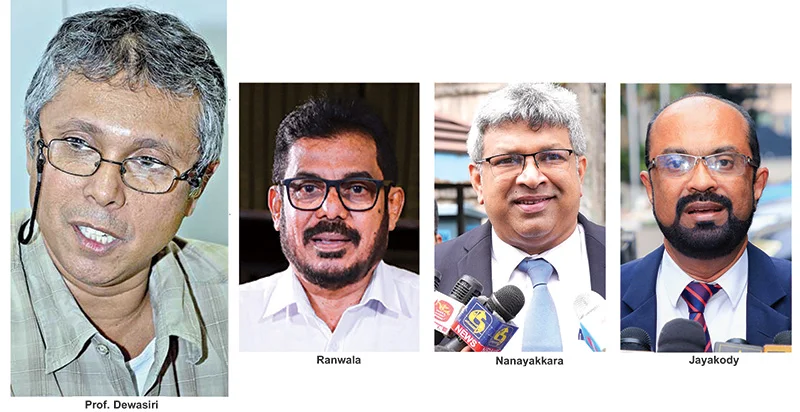
By Shamindra Ferdinando
Prof. Nirmal Ranjith Dewasiri was the first to question the National People’s Power government over Speaker ‘Dr.’ Asoka Sapumal Ranwala regarding his academic qualifications.
Dewasiri’s shock query caught the NPP by surprise. The academic questioned the government on his social media account on 05 Dec. The Parliament unanimously appointed Ranwala as Speaker of the Tenth Parliament on 21 Nov.
Dewasiri demanded that the government compel Speaker Ranwala to resign in case the parliamentarian deliberately provided false information. If the Speaker declined to do so, appropriate measures should be taken to remove him, Prof. Dewasiri declared, while finding fault with the new entrant for (i) falsely claiming to have a degree and (ii) believe he could hold such an important position regardless of the deceit perpetrated by him.
Prof. Dewasiri emphasized that the second fault was far worse than the first. One-time spokesperson for the Federation of University Teachers Association (FUTA) and advocate of the Yahapalana administration warned the government of far reaching consequences as it was badly exposed.
The government obviously didn’t take Prof. Dewasiri’s social media post seriously. Perhaps the top leadership felt that the issue at hand wouldn’t attract much public attention. However, the Opposition, both in Parliament and outside, launched an all-out attack.
The SJB declared its intention to move a no-confidence motion against the Speaker. In spite of the NPP having an unprecedented 2/3 majority in Parliament, the ruling party feared to face the Opposition move. The NPP could have easily routed the combined Opposition in Parliament, but to defend an obvious wrongdoer would have ruined President Anura Kumara Dissanayake’s (AKD) parliamentary group as they came to power, less than three months ago, promising to correct all the shenanigans that had been going on in the country, under the guise of democracy, since independence.
Beleaguered AKD had no option but to ask Speaker Ranwala to step down. The NPP could have avoided a lot of flak if the party acted immediately after Prof. Dewasiri’s disclosure. If not for the intervention made by the academic and a vociferous critic of wrongs done by the previous regimes, particularly to academics, Ranwala would still have been the Speaker.
The utterly dispirited SJB wouldn’t have inquired into Ranwala’s credentials under any circumstances. Thanks to Prof. Dewasiri, the Opposition received a mega opportunity to question the very basis of the NPP’s presidential and parliamentary election campaigns.
The SJB and new Democratic Front (NDF) had been rejected by the electorate to such an extent, even if they challenged Ranwala over his educational qualifications, the people may have ignored the issue as the rantings of a frustrated Opposition still licking the wounds of their routing at the polls. Prof. Dewasiri’s disclosure obviously delivered a knockout blow to the government.
Ranwala resigned on 13 Dec., just over a week after Prof. Dewasiri’s bombshell revelation. It would be pertinent to mention that just before the announcemnt of the Speaker’s resignation, President AKD told government media bosses that he wouldn’t protect any wrongdoer.
Having asked the electorate to reject unscrupulous political parties that had ruined the country, the NPP couldn’t have risked its political project to save Ranwala, one-time President of the Ceylon Petroleum Common Workers’ Union, until he was sent on compulsory retirement in March 2023 by the then Minister of Power and Energy Kanchana Wijesekera. The Wickremesinghe-Rajapaksa government accused Ranwala of obstructing fuel distribution services.
The NPP couldn’t have been unaware of Ranwala’s bogus claim. If Ranwala deliberately deceived the NPP, he should be dealt with harshly. Perhaps Ranwala should be asked to resign his parliamentary seat forthwith for deceiving the whole country, to pave the way for the NPP to fill that Gampaha District vacancy thereafter. Having vowed to clean up Parliament, the NPP cannot, under any circumstances, protect any wrongdoer.
But, corrupt political parties shouldn’t think for a moment that they can capitalize on the Speaker’s issue. The people rejected the SJB, NDF and SLPP (Sri Lanka Podujana Peramuna) twice this year as they earned the wrath of the people. It would be a grave fault on their part if they believed Ranwala’s ouster could strengthen their campaign against the government.
The NPP should, without delay, set the record straight. The issue is whether Ranwala deceived the NPP with regard to his doctorate, or the party knew all along that their CPC trade unionist didn’t have the academic qualification which he proudly flaunted.
House tricked
Premier Dr. Harini Amarasuriya and Foreign Minister Vijitha Herath, together, accompanied Ranwela to the Speaker’s chair. The Opposition accepted the appointment. The Premier proposed Ranwala, while Minister Herath seconded that proposal.
Premier Amarasuriya, Opposition Leader Sajith Premadasa, and Leader of the Sri Lanka Muslim Congress Rauff Hakeem congratulated National Executive Committee member Ranwala on that occasion.
One-time member of the Biyagama Local government body, Ranwala twice represented the JVP in the Western Provincial Council. According to Parliament website, Ranwala holds a degree in Chemical Engineering from the University of Moratuwa and a doctorate in Biochemistry from Waseda University, Japan.
To make matters worse for the NPP, the Opposition challenged Deputy Speaker Dr. Rizvie Salih’s specialist tag. Salih answered his critics. His FB post explained his nearly 40-year career, with 12 years with the public sector, though he is not a specialist.
The Deputy Speaker told Parliament, on Tuesday, that he is not a specialist and never used the title in his official letterheads, visiting cards and prescriptions. ” I have categorically told that I should not be called a specialist in propaganda material during elections,” he said. In other words, he had found fault with those who handled the propaganda campaign for the NPP
Interested parties also challenged the doctorate of Justice Minister Harshana Nanayakkara, another first time entrant to Parliament.
The controversy over Nanayakkara’s doctorate took an unexpected turn when the Parliament claimed that the doctorate had been inadvertently mentioned by Parliament. Let me reproduce the clarification issued by M. Jayalath Perera, Director Legislative Services / Director Communication (Acting), Parliament: Clarification Regarding the Title of “Dr.” mentioned before the name of the Minister of Justice, Attorney-at-Law, Hon. Harshana Nanayakkara, on the Parliament website.
“I would like to emphasize the following points in relation to reports published in the media regarding the title of ‘’Dr.’’ mentioned before the name of the Minister of Justice and National Integration, Attorney-at-Law, Harshana Nanayakkara, in the directory of Members of Parliament on the Parliament website.
“It is important to note that Hon. Harshana Nanayakkara has not indicated holding a doctoral degree in the information provided to Parliament. The appearance of the title “Dr.” before the Minister’s name was a result of an error in entering the relevant data. Accordingly, steps have been taken to rectify this mistake.
“I express my deepest regret for the inconvenience caused to the Minister of Justice and National Integration, Attorney-at-Law, Hon. Harshana Nanayakkara, in this regard.
“Also, the process of re-checking and updating the information of all Members of Parliament on the Parliament website is currently underway.”
But those who cannot stomach the NPP’s victory ask why didn’t Nanayakkara get that corrected himself if he was not entitled to be called “Dr.”? However, the Justice Minister lodged a complaint with the CID on Monday (16). The investigation can help ascertain whether some interested party conspired to discredit the NPP.
That clarification issued by Parliament meant that Ranwala provided false information to Parliament. According to Jayalath Perera, the parliamentary staff entered the relevant data provided by lawmakers, hence the only mistake on their part pertained to the Justice Minister’s data.
Power Minister Kumara Jayakody, too, lodged a complaint with police seeking an investigation into what he called an organized attempt to discredit him by challenging his academic qualifications. Both Nanayakkara and Jayakody speculated about the possibility of those who had been rejected by the people and their associates and supporters being involved in the high profile campaign.
The NPP cannot afford to disappoint 5.7 mn people who voted for AKD at the presidential election and 6.8 mn at the general election. The NPP increased its voter tally from 5.7 mn to 6.8 mn within a couple of weeks whereas the SJB was reduced to 1.9 mn votes from 4.3 mn at the presidential poll. The NDF was reduced to just 500,000 votes from 2.2mn at the presidential election while the SLPP increased its tally from 340,000 to 350,000. The Opposition is in disarray and in a pathetic situation.
Ranwala’s fiasco has sort of given the Opposition false hopes of a quick comeback. The forthcoming local government polls will show the ground situation. The NPP must keep in mind that in addition to the Ranwala affair, the failure on its part to provide sufficient relief to fuel and electricity consumers as promised has caused much public anger. Having repeatedly alleged that the previous government couldn’t substantially reduce fuel prices as the then Minister Kanchana Wijesekera pocketed the money, and having made those claims against the previous Minister in charge of the subject, the NPP brought down the price of a litre of Octane 92 by just 2 rupees much to the public’s resentment.
The pathetic handling of the rice mafia, too, didn’t do the NPP any good. Throughout the polls campaigns, the NPP repeatedly assured that the rice mafia would be appropriately dealt with and prices brought down and stabilized. The NPP also promised that rice wouldn’t be imported at all though imports would meet the tourist sector requirement. That much touted promise, too, was broken. However, the electorate, the writer is certain, doesn’t see any point in once again pinning their hopes on the utterly corrupt and dishonest lot rejected at the presidential and parliamentary polls.
Why Parliament shouldn’t defend wrongdoers
During the general election campaign, AKD explained why Parliament shouldn’t protect wrongdoers. The President said that the Yahapalana Parliament (2015-2019), during Karu Jayasuriya’s tenure as the Speaker, defeated a no-confidence motion moved against Ravi Karunanayake over the Treasury bond scams, especially after he told the Presidential Commission of Inquiry that probed it, he could not remember the person who gave him a luxury penthouse at Kollupitiya. Then in 2023 the Wickremesinghe-Rajapaksa government defended Keheliya Rambukwella when a no-faith motion was moved against him over corruption in the health sector procurement, the President said.
Having said so, AKD couldn’t have defended Ranwala in case the SJB handed over a no-confidence motion against him. In fact, the NPP has created an environment that may prevent those exercising political power from coming to the rescue of wrongdoers under any circumstances.
During Ranwala’s very short stint as the Speaker, he had the opportunity to receive several foreign dignitaries. Press releases issued by Parliament following those meetings referred to Ranwala as Dr. Ranwala.
South Korean Ambassador Miyon Lee paid a courtesy call on Speaker Ranwala on 04 Dec. at the Parliament complex. Secretary General of the Parliament Mrs. Kushani Rohanadeera, was also present on the occasion. This happened the day before Prof. Dewasiri exposed the NPP parliamentarian.
Ranwala, not aware of what was coming, addressed the newly elected members on 25 Nov., in Parliament, where he emphasized the responsibility on the part of newcomers (he, too, was a newcomer struggling to handle responsibilities for want of parliamentary experience) to familiarize with parliamentary procedures. Speaker Ranwala said that public expectations couldn’t be met unless they learnt about parliamentary procedures. Ranwala was addressing the inaugural session of the orientation programme for lawmakers.
The Parliament website quoted Speaker Ranwala as having emphasized the importance of organizing such workshops, noting that a thorough understanding of parliamentary traditions, constitutional frameworks, standing orders, and related parliamentary procedures is crucial for serving the people through the diverse debates conducted within Parliament.
Chinese Ambassador in Colombo Ambassador Qi Zhenhong was the first envoy to pay a courtesy call on Ranwala at the Parliament. The Chinese Ambassador conveyed the greetings of the Chairman of the Standing Committee of the National People’s Congress of the People’s Republic of China (Speaker of the Parliament of the People’s Republic of China) Zhao Leji, to the newly elected Speaker of the Tenth Parliament during the meeting.
The Chinese envoy was followed by Indian High Commissioner Santosh Jha. Jha paid a courtesy call on the Speaker on 28 Nov. at the Parliament.
The United Nations Resident Coordinator in Sri Lanka, Marc-André Franche, met Speaker Ranwala on 04 Dec.
In the wake of Prof. Dewasiri’s shocking disclosure, Speaker Ranwala received a high-level US delegation led by Assistant Secretary of State for the Bureau of South and Central Asian Affairs Donald Lu. The meeting took place on 06 Dec.
The delegation included Ms. Anjali Kaur, Deputy Assistant Administrator of the Bureau for Asia at USAID, and Mr. Robert Kaproth, Deputy Assistant Secretary for Asia at the US Department of the Treasury.
According to a press release issued by Parliament the meeting focused on Sri Lanka’s reform priorities and the critical role of the House in advancing the people’s mandate for accountability, transparency, and inclusive governance.
Ambassador of the United Arab Emirates to Sri Lanka Khaled Nasser AlAmeri was the next to pay a courtesy call on Speaker Ranwala. That meeting took place on 09 Dec. amidst a stepped-up campaign against Speaker Ranwala. The NPP seems to have operated on the premise that the controversy over the Speaker’s credentials would gradually fade away. But, the media pressed the Cabinet spokesperson Dr. Nalinda Jayatissa over the simmering serious issue. That controversy sort of overwhelmed the NPP that worked so hard to portray all other political parties, other than them, as corrupt to the core.
In fact, the NPP had nothing else but to depend on what it called a new clean political culture. Having impressed the electorate with nothing but promises and assurances that it would do the right thing, it couldn’t have a blatant liar as the Speaker.
If not for the political culture that had been introduced by the NPP, in the wake of Aragalaya in 2022, the false declaration made by Ranwala wouldn’t have been an issue at all. The people would have simply accepted it as just another lie. Our inefficient and useless Parliament had been so disgraceful in its conduct and encouraged public resentment that a Speaker’s false claim wouldn’t have caused a public furore.
The NPP’s failed bid to storm Parliament during the final push against President Gotabaya Rajapaksa should be examined taking into consideration the pathetic state of our Parliament. Some of those unscrupulous men who represented Parliament over the past two to three decades brought about the Parliament’s collapse. Instead of taking remedial measures, political parties allowed the deterioration to continue, unabated. Nothing can be as ridiculous as conducting student parliaments all over the provinces. What the Parliament really expected to achieve by promoting student parliaments at a time the very basis of the parliamentary system is under threat due to overall failure of the political party system.
Parliament must take appropriate measures to restore public confidence in the highest institution in the country. Ranwala’s affair proved beyond doubt that the Speaker, who is also the Chairman of the Constitutional Council, could manipulate the system. No one and no political party should be above the law. War-winning Sri Lanka had suffered unbearable losses for want of proper parliamentary control over public finance over the years.
Let us hope the NPP has learnt a hard lesson at the onset of AKD’s five-year term that would help the party to navigate choppy waters. The daunting challenges faced by a bankrupt country should prompt all political parties, represented in Parliament, to reach consensus on Sri Lanka’s response to the deal with the IMF, signed by Ranil Wickremesinghe. The issue the Parliament must grapple with is how to transform the sick national economy to make it possible for us to start repaying foreign debt in 2028 without making most of us absolute paupers, but many Lankans are already in dire straits economically.
The Parliament can begin by making the Supreme Court judgment on the economic crisis that led to Gotabaya Rajapaksa’s removal available to new members of Parliament. Of the 225 MPs, 162 are new entrants. The Supreme Court in Nov. 2023 issued a symbolic ruling that Rajapaksa brothers – including two ex-Presidents – were guilty of triggering the worst financial crisis by mishandling the economy.
In a majority verdict on multiple petitions filed by academics and civil rights activists, a five-judge bench of the Supreme Court ruled that the respondents, who all later resigned or were sacked, had violated public trust. But that verdict should be examined along with massive foreign loans taken by the Yahapalana government during the 2015-2019 period at high interests that contributed massively to the crisis.
Let there be no holds barred examination of the economic crisis and exposure of all responsible, regardless of their status. However, that wouldn’t be a reality unless the legislature fulfils its basic obligations in terms of the Constitution.
Let us also not lose sight of hidden hands, especially from the West who make matters worse through their cloak and dagger operations worldwide as also was put into operation here during Gotabaya Rajapaksa presidency, like even cutting off worker remittances from our banking system thereby we couldn’t even scrape together a few million dollars to clear even a shipment of cooking gas. They have done similar jugglery to so many other countries, even in our neighbourhood, as has been the case already in Bangladesh and Pakistan. Modi should not feel all that smug as we do not know what plots are being hatched against him.
Remember the uncompromising Aragalaya activists who were threatening to die for a system change in the country, but disappeared into thin air no sooner Ranil Wickremesimnghe was installed in the seat of power with the ouster of Gotabaya Rajapaksa by extra parliamentary means.
-
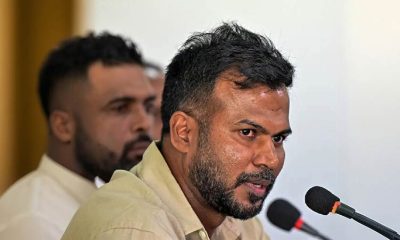
 Sports5 days ago
Sports5 days agoSri Lanka to mend fences with veterans
-

 Sports3 days ago
Sports3 days agoPathirana set to sling his way into Kiwi hearts
-
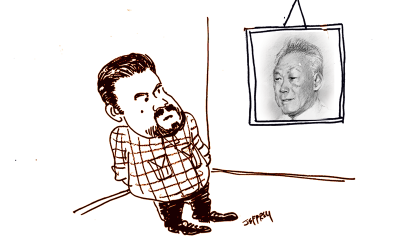
 Opinion5 days ago
Opinion5 days agoIs AKD following LKY?
-

 Editorial6 days ago
Editorial6 days agoHobson’s choice and U-turns
-
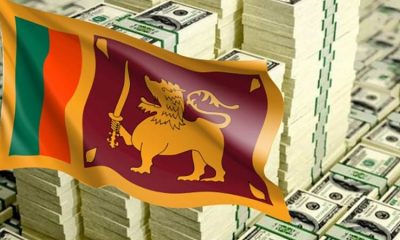
 News4 days ago
News4 days agoSL issues USD 10.4 bn macro-linked bonds
-

 Opinion5 days ago
Opinion5 days ago‘A degree is not a title’ – a response
-

 Editorial4 days ago
Editorial4 days agoRanil’s advice
-
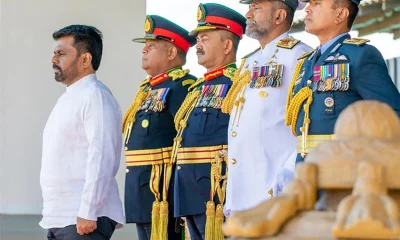
 News1 day ago
News1 day agoOffice of CDS likely to be scrapped; top defence changes on the cards











